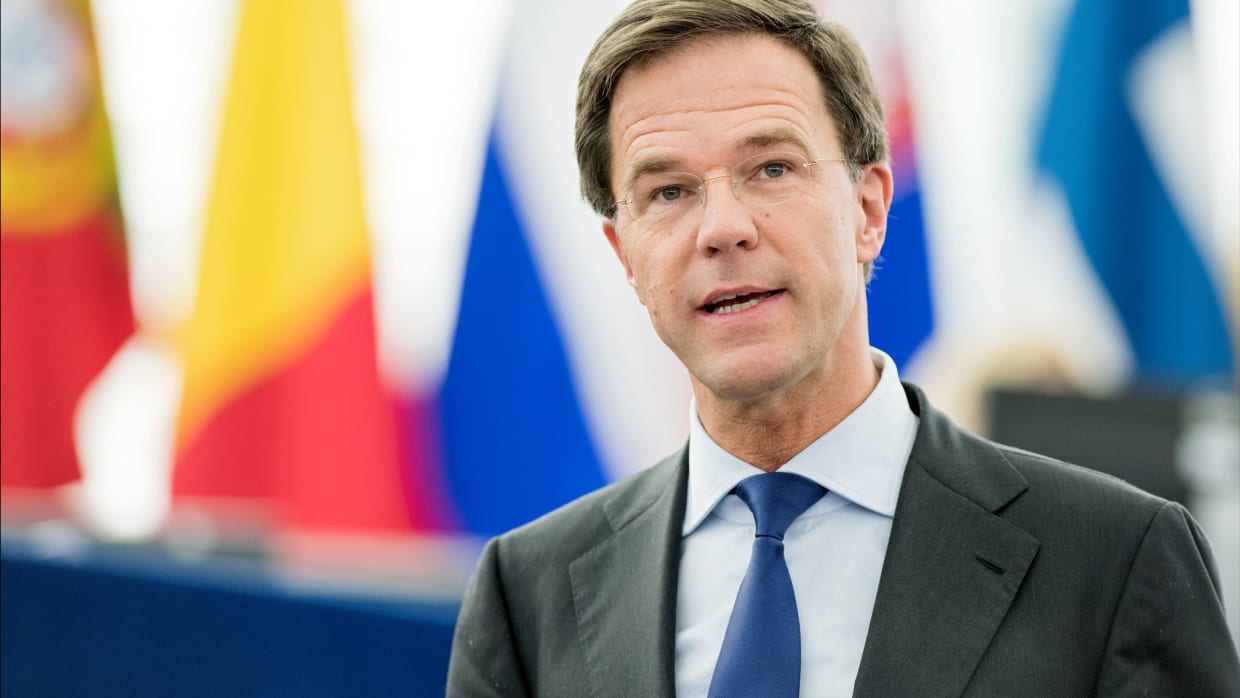
Mark Rutte wanted liberal excitement in higher education
Prime Minister Mark Rutte is quitting. He announced Monday morning that he will not head up the list for the VVD in the upcoming elections. What has his impact been on higher education?
Mark Rutte will go down in history as the longest-serving prime minister of the Netherlands, longer than Ruud Lubbers and Willem Drees. His name will remain associated with the corona crisis, the benefits scandal, the damage from gas extraction in Groningen, and the apologies for slavery.
But just before his premiership in 2010, the world looked very different. What did the VVD leader call his biggest political blunder at the time? “Calling on students to occupy university buildings in 2005, as Secretary for Education,” he told the newspaper NRC. “That even led to charges being filed against me.”
Ribbon, coffee
It was indeed a remarkable moment. As Secretary for Higher Education (2004-2006), Rutte liked to cause a stir. Were students dissatisfied with their education? Then they should just occupy a faculty for a few days, Rutte said on current affairs program Netwerk. There are very practical ways to do that. You have to buy ribbon and find the fuse box, you name it. I’ll explain all that to you.” He promised to stop by with coffee, though.
Not long afterwards, students did occupy the Amsterdam Maagdenhuis to protest Rutte’s plans. And no, he didn’t come by. The building was cleared and activists had to pay fines. Then the student organizations filed charges against Rutte for sedition, since he had, after all, called for an occupation.
Excitement
How did it come to this? As Secretary for Higher Education, Rutte was by no means afraid of making enemies. He wanted excitement, he said, and he didn’t see enough of it. He did all sorts of things to excite administrators. He tried, for example, to launch a bureaucracy meter (to fight overhead costs) and advocated a ranking of good and bad educational institutions. “That hits administrators in their ego,” he predicted.
But that was mostly a lot of hot air. More important were his plans for major changes in higher education. He strove for stricter selection for admission to programs and variable tuition fees: good programs were allowed to charge a little extra. Mutual competition between universities and colleges was fine by him. “You can only sell an A-brand well if the quality is good.”
So when he was set to leave his post as Secretary for Higher Education to lead the VVD, the activist students of the National Union of Students were not too sad. “Rutte has turned out to be a bit of a wolf in sheep’s clothing,” said then-Vice President Stef Beek. “He pretends to be the students’ great friend and meanwhile allows market forces and top tuition fees in higher education. When he leaves, I will give him a bouquet of flowers. I’ll be happy to wave him goodbye.”
Learning Rights
Even more fundamental was Ruttes plan for “learning rights.” Higher education funding had to follow students, he thought. They would henceforth receive a type of voucher that they could spend at colleges and universities of their choice. Not satisfied with your education? Then “vote with your feet” and study somewhere else. That would force colleges to offer quality.
In addition, it would force students to hurry: you could walk out twice in two years, and then your tuition rights were up. After that, you had to pay for your education yourself. The latter idea would later return as the “long study penalty” for slow students. Both proposals fell just short of approval, both times because of the collapse of a cabinet.
Basic grant
What did succeed was abolishing the basic scholarship as of September 2015. At that time he was not State Secretary, but Prime Minister. His cabinet of VVD and PvdA (Rutte II) made a deal with opposition parties D66 and GroenLinks. Students would no longer receive a basic grant and would only be allowed to borrow. But the supplementary grant was increased and the repayment conditions became a lot more flexible.
That was not a success, either. The course was changed within eight years: from September 2023, students will again receive a basic grant and unlucky students will receive a small allowance. This is probably against Rutte’s wishes, as he always continued to defend the elimination of the grant.
Fraud
On his watch, the fight against fraud within the government also gained steam, with the worst example being the benefits scandal. Further education is now also experiencing such a scandal: the monitoring of the basic grant for those living away from home affects almost exclusively students with a migration background, based on what is sometimes paper-thin evidence.
So are all the problems entirely Rutte’s fault? No, of course, he could not have acted entirely on his own. For example, the monitoring was set up by PvdA minister Ronald Plasterk and the basic scholarship was abolished by PvdA minister Jet Bussemaker. But these policies fit seamlessly into Rutte’s vision.
Now what?
Now Rutte’s fourth cabinet has been toppled. The question is what it will mean for higher education and research. Under Minister Robbert Dijkgraaf, the winds of change were clearly blowing. He wanted to curb the standard for binding study advice, for example, to combat stress among students. That is typically a subject Rutte had little affinity for.
Dijkgraaf also made his mark on the distribution of hundreds of millions of euros in research money. Instead of hassles with competition and struggles for research money, universities are allowed to distribute grants themselves.
So after years of neoliberal policies, in which Mark Rutte played a major role, Dijkgraaf was able to adjust the course of the supertanker a bit. Probably less than he would have liked: he was working on an extensive foresight study that would also affect the financing of higher education.
Any adjustments must now be left to the next cabinet, with or without him. But who knows, maybe that next cabinet will be a tick more neoliberal.

